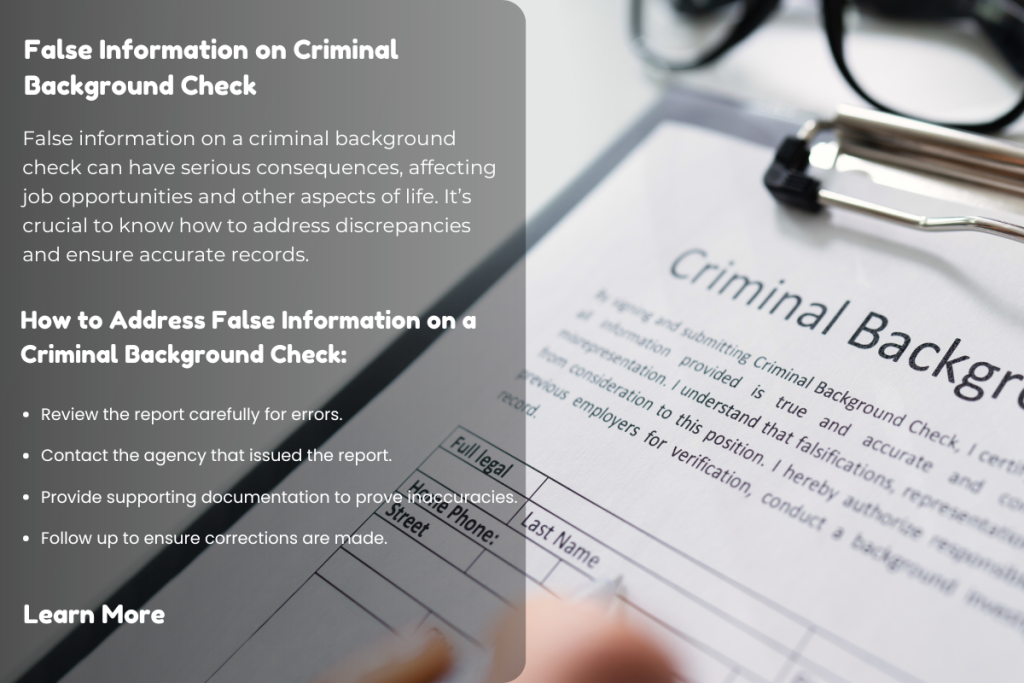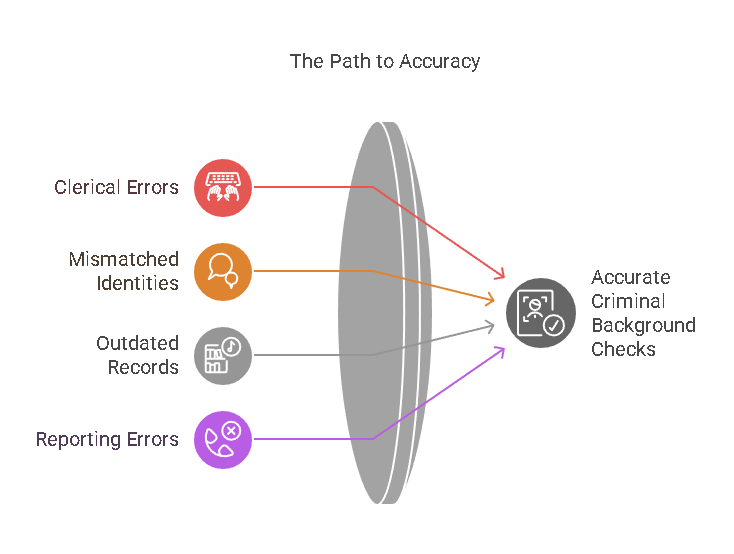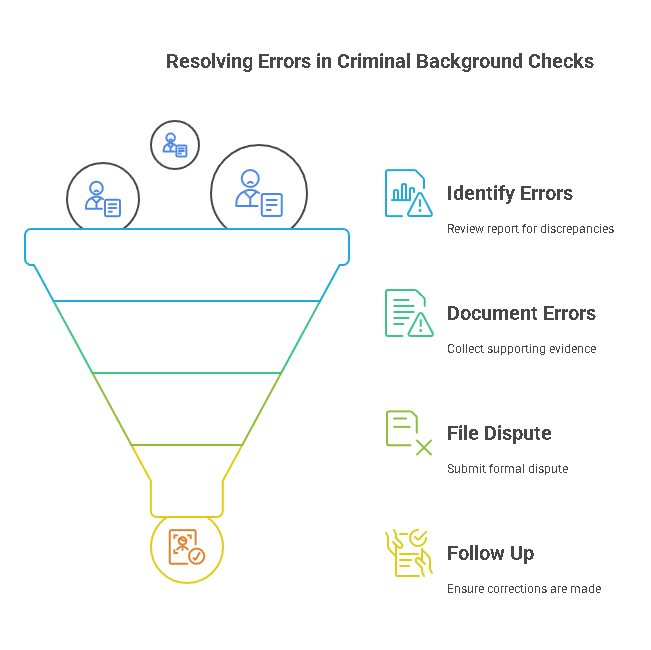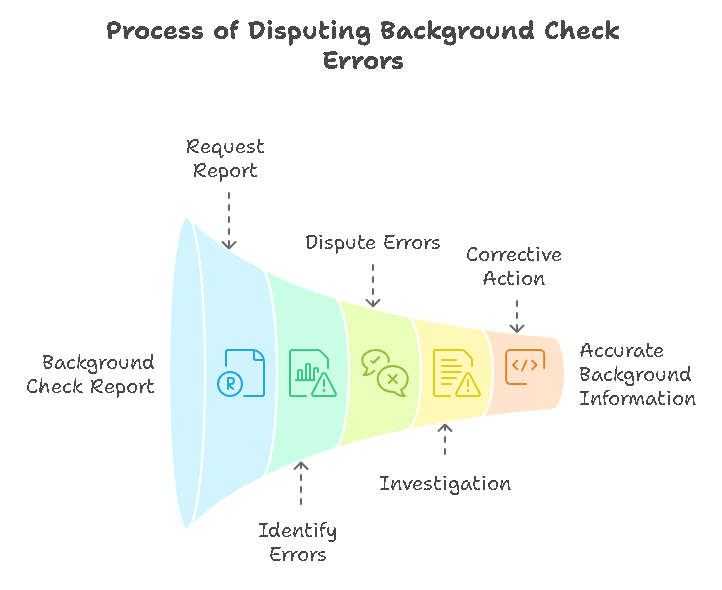How to Handle False Information on Criminal Background Checks: A Complete Guide

False Information on Criminal Background Check: Understanding the Causes and Impact
Criminal background checks are a crucial tool in various industries, especially in employment, housing, and legal matters. They offer a comprehensive look at an individual’s criminal history, providing employers and organizations with valuable insights into potential risks. However, in the process of conducting these checks, errors can occur, leading to false information that can cause significant consequences. False information on criminal background checks can hinder job opportunities, damage reputations, and lead to legal complications. Therefore, understanding the causes of inaccurate data and how to address them is essential for both job seekers and employers.
What is False Information on Criminal Background Checks?
False information on criminal background checks refers to incorrect or misleading data that appears in an individual’s criminal record. This can include errors such as charges that were dismissed or expunged, outdated records, or information linked to another person with a similar name. False information can have a serious impact on both individuals and employers, especially if it leads to unfair decisions in employment or other important areas of life.
The Importance of Accurate Criminal Background Checks

Accuracy in criminal background checks is crucial for multiple reasons. For employers, an accurate background check ensures that they are making informed hiring decisions and reducing potential liabilities. It also ensures compliance with legal regulations and minimizes the risk of hiring individuals who may pose a threat to the organization. For individuals, a mistake on a background check can lead to missed employment opportunities, social stigma, and unnecessary legal battles. Given the weight these checks carry, it is essential that they reflect the most up-to-date and correct information.
Common Causes of False Information on Criminal Background Checks
While criminal background checks are designed to be accurate, a variety of factors can lead to discrepancies in the information. Here are some of the most common causes of false information:
- Clerical Errors
One of the most frequent causes of false information is clerical errors, such as typos or data entry mistakes. These errors can occur when records are manually input into databases or when the information is transferred from one system to another. A simple typographical error in a name, date of birth, or charge could result in the wrong individual being linked to a criminal record. - Mismatched Identities
Mismatched identities are another significant cause of false information. This typically happens when two people share similar names or other personal details, such as birthdates or addresses. A common name, like “John Smith,” can lead to confusion in databases, where records from multiple individuals are mistakenly merged. This can cause a criminal record from someone with the same name to appear on an entirely different person’s background check. - Outdated Records
In some cases, criminal background checks may include records that are outdated or no longer relevant. For example, a criminal conviction may have been expunged, or charges may have been dropped, but the record still appears in databases. When outdated records are not properly updated or removed, they can create a false picture of an individual’s criminal history. - Reporting Errors by Agencies
Criminal background checks often rely on data from multiple agencies, such as police departments, courts, and third-party services. If any of these sources report incorrect or incomplete information, it can lead to discrepancies in the background check results. For example, a reporting agency may have failed to update their records or mistakenly included data from another individual, which would be reflected on the background check.
The Impact of False Information on Criminal Background Checks
False information on criminal background checks can have far-reaching consequences, particularly in employment and legal matters. The following outlines the impact that inaccuracies can have on both job seekers and employers.
- On Job Seekers
False information on a criminal background check can cause significant harm to an individual’s career prospects. If inaccurate data is linked to a person’s background, it could lead to a rejection from a job opportunity, even if the individual has never committed any criminal offenses. This can be particularly frustrating when a background check contains outdated or expunged information that no longer reflects the person’s true history. Beyond lost job opportunities, individuals may suffer emotional distress, damage to their reputation, and a long, difficult process to correct the inaccuracies. - On Employers
Employers also face risks when false information is reported on background checks. If an employer relies on incorrect criminal background information to make hiring decisions, they may face liability issues. For example, denying employment to someone based on inaccurate data could result in legal action against the company for discriminatory practices or wrongful termination. Additionally, hiring delays may occur while employers attempt to resolve discrepancies, costing both time and resources. Lastly, businesses may suffer reputational damage if word spreads that they’ve been making hiring decisions based on flawed background checks.
The Need for Accurate Data in Employment
In today’s competitive job market, background checks are one of the most critical steps in hiring decisions. Employers rely on these checks to ensure they are bringing the right talent into their organizations while protecting their workplace from potential risks. At the same time, job seekers want to ensure that their criminal records accurately reflect their history and that they are not unfairly judged based on errors.
Given the significant impact of false information, it is essential for both job seekers and employers to understand the causes of errors and take proactive steps to ensure that the data being used is accurate and up-to-date.
The Significance of Accuracy in Criminal Background Checks
As we have discussed, the consequences of false information on criminal background checks are wide-reaching. For job seekers, inaccurate criminal records can lead to missed opportunities, reputational damage, and unnecessary stress. Employers also face risks if they make decisions based on incorrect data, potentially facing legal ramifications or damaging their reputation.
The need for accuracy in criminal background checks cannot be overstated. It is essential for both individuals and employers to be vigilant in ensuring that the information being used in these checks is accurate and up-to-date. In the next section, we will explore how to address and prevent false information in criminal background checks, as well as the steps individuals and employers can take to protect themselves from the consequences of errors.
Addressing and Preventing False Information on Criminal Background Checks

When false information appears on a criminal background check, it’s important to take proactive steps to resolve the issue as quickly as possible. Addressing inaccurate information can help protect an individual’s reputation, prevent career setbacks, and avoid potential legal complications.
- Obtaining Your Background Check Report
The first step in addressing errors is to request a copy of your criminal background check from the relevant agencies or screening services. Individuals can contact local police departments, courts, or third-party background check providers to obtain their reports. Depending on the service, these reports can typically be obtained online or by submitting a formal request. It is important to ensure that the report includes all the necessary details, such as any criminal history, arrests, or convictions associated with your name. - Identifying and Documenting Errors
Once you have the background check, thoroughly review the information for discrepancies. Common errors to look for include:- Outdated Information: For example, dismissed charges or expunged records that still appear in the report.
- Mismatched Identities: This often occurs when there are common names or similar personal details that may cause records to be incorrectly attributed to you.
- Incorrect Personal Information: Ensure that the name, birthdate, social security number, or address associated with the background check is accurate.
By documenting the errors, you can build a case for the dispute. Collect any necessary supporting documents, such as court orders for expungement or proof of identity, to help validate your claim.
- Filing a Dispute
Once you’ve identified errors and gathered supporting documentation, the next step is to file a formal dispute with the agency or background check provider responsible for the incorrect information. The dispute process typically involves:- A written request explaining the errors found on the background check
- Documentation that proves the mistake (such as court records or proof of identity)
- Contact information to follow up on the status of the dispute.
It’s essential to submit the dispute in writing and keep a copy for your records. Under the Fair Credit Reporting Act (FCRA), background check companies are legally required to investigate disputes within 30 days. If the information is found to be incorrect, it must be removed or corrected.
- Following Up on Corrections
After submitting the dispute, make sure to follow up with the agency or background check provider. While the law requires them to resolve the dispute within 30 days, it is important to ensure that the necessary updates have been made. If the issue isn’t resolved in a timely manner, or if corrections aren’t made after a thorough review, you can escalate the issue by contacting regulatory bodies, such as the Consumer Financial Protection Bureau (CFPB) or the Federal Trade Commission (FTC). Documenting all communication with the agency is essential to support any further actions you may need to take.
Preventing False Information on Criminal Background Checks
While resolving false information is important, taking preventive measures can help reduce the likelihood of errors in the first place. Both individuals and employers can take proactive steps to avoid discrepancies in criminal background checks.
- For Individuals: Regularly Monitor Your Criminal Record
One of the most effective ways to prevent false information from appearing on your background check is by regularly monitoring your criminal record. Individuals can request a copy of their criminal record at regular intervals to verify its accuracy. Some steps to consider include:- Requesting a copy of your criminal background check periodically from local law enforcement agencies or background check providers.
- Tracking any legal proceedings in which you’ve been involved (including arrests, charges, or court rulings), ensuring these events are properly reflected.
- Monitoring expunged or dismissed records to ensure that they are removed from public databases.
By staying vigilant and reviewing your criminal record, you can identify any discrepancies early and take steps to correct them before they impact your background check.
- For Employers: Best Practices for Ensuring Accuracy
Employers play a vital role in ensuring the accuracy of the background checks they rely on to make informed hiring decisions. The following practices can help reduce the chances of false information affecting an employment decision:- Partnering with Reliable Background Check Providers: It’s essential to work with reputable background check companies that use updated and accurate databases. By choosing a provider that adheres to the standards set by the Fair Credit Reporting Act (FCRA), employers can ensure that they are accessing reliable data.
- Using Identity Verification Tools: Identity verification tools can reduce the risk of mismatched identities by confirming personal details such as social security numbers, birthdates, and addresses. These tools help ensure that the background check is linked to the right individual and not to someone with a similar name or identifying information.
- Implementing Clear Screening Processes: Establishing a standard operating procedure for conducting background checks can help prevent errors. Employers should train hiring managers and HR teams to review background check reports for common mistakes such as name mismatches or outdated records and provide candidates with a chance to address any discrepancies.
Precisehire’s Role in Employment Screening
At Precisehire, we understand the importance of accuracy in criminal background checks. As a leading provider of comprehensive background screening services, we help employers and individuals avoid the risks associated with inaccurate criminal records.
How Precisehire Ensures Accurate Criminal Background Checks
We provide reliable background check services that utilize updated and accurate databases. Our background check reports are thoroughly vetted to ensure that they reflect the most up-to-date information, minimizing the risk of errors that could harm job prospects or lead to legal complications. Additionally, we offer identity verification tools to ensure that background checks are tied to the correct individual, further reducing the risk of false information.
Supporting Dispute Resolution for Employers and Individuals
At Precisehire, we don’t just offer background checks—we also provide support for dispute resolution. If an error appears on a background check, we assist both individuals and employers in navigating the dispute process. We provide guidance on how to dispute inaccuracies, offer advice on gathering necessary documentation, and help ensure that corrections are made swiftly.
Reducing Risks and Ensuring Compliance
By partnering with Precisehire, employers can minimize the risk of making hiring decisions based on inaccurate or outdated criminal records. Our services help businesses comply with all legal regulations, including the Fair Credit Reporting Act (FCRA), while ensuring that background checks are both accurate and timely. We work closely with employers to streamline the hiring process and ensure a fair and transparent decision-making process.
Data Table: Common Causes of False Information in Criminal Background Checks
| Cause of False Information | Description | Impact |
|---|---|---|
| Clerical Errors | Typos or data entry mistakes in records. | Incorrect names, dates of birth, or charge details. |
| Mismatched Identities | Individuals with similar names or personal details. | Records may be mistakenly linked to the wrong person. |
| Outdated Records | Expunged or dismissed charges that still appear. | Shows criminal history that no longer applies. |
| Reporting Errors by Agencies | Inaccurate data reported by agencies or third-party services. | False or incomplete records reported in the background check. |
Legal Aspects of Criminal Background Checks

Criminal background checks are critical to the hiring process, as well as for many other purposes, such as obtaining loans, housing, or security clearance. However, legal protections exist to ensure that these checks are accurate, fair, and transparent. Understanding the legal landscape surrounding criminal background checks helps individuals protect their rights, and employers maintain compliance.
Overview of the Fair Credit Reporting Act (FCRA)
The Fair Credit Reporting Act (FCRA) is the primary federal law governing the collection and dissemination of consumer information, including criminal background checks. This act ensures that consumer reporting agencies (CRAs) maintain accurate records and follow fair processes when reporting background check data.
Key provisions of the FCRA include:
- Accuracy: All criminal background reports must contain accurate and current information. Errors, including outdated or incorrect criminal records, can harm individuals and must be rectified promptly.
- Transparency: The FCRA requires that individuals have access to their background checks and can dispute errors. If an individual finds incorrect information, they are legally entitled to file a dispute.
- Adverse Action Notices: If an employer uses the results of a background check to deny employment, they must provide a pre-adverse action notice to the candidate, allowing them an opportunity to dispute the findings before a final decision is made.
The FCRA provides robust protections for individuals, ensuring that their rights are upheld during the background check process.
Legal Rights for Individuals to Dispute Errors
If an individual finds that their criminal background check contains false or outdated information, they have several legal rights under the FCRA:
- Requesting a Report: Individuals are entitled to receive a free copy of their background check report from the major consumer reporting agencies once every year. By reviewing the report, individuals can catch errors early.
- Disputing Errors: If errors are identified, individuals can dispute them with the reporting agency. They should provide documentation, such as court orders or proof of expungement, to support their claims.
- Investigation Requirement: Once a dispute is filed, the reporting agency must investigate and resolve the matter within 30 days. If the agency cannot verify the information, they must remove or correct it.
- Corrective Action: If the dispute is found to be valid, the reporting agency is required to correct or remove the inaccurate information and notify any third parties who received the report.
Obligations of Employers and Reporting Agencies
Both employers and background check agencies have specific obligations under the law:
- Employers must comply with the FCRA when using criminal background checks for hiring decisions. They must provide pre-adverse action notices before rejecting an applicant based on a background check report and allow individuals to dispute any false information.
- Reporting agencies are responsible for ensuring that the criminal background information they provide is accurate, current, and relevant. If errors are found, they must investigate and correct the inaccuracies in a timely manner.
If either party fails to comply with the regulations, they may be subject to legal action, including fines or lawsuits from individuals affected by inaccurate background information.
FAQs
Addressing some of the most common questions regarding false information on criminal background checks:
How Can I Dispute False Information on My Background Check?
To dispute false information, you must contact the background check agency that provided the inaccurate report. Provide them with supporting documents, such as proof of expungement or court records, and file a formal dispute. The agency must investigate the dispute and make corrections within 30 days.
How Long Does It Take to Correct Errors in a Background Check?
Once a dispute is filed, the agency has 30 days to investigate and correct any errors. If the information is confirmed to be false, the agency must update the report and notify the employer and any other parties who received it.
What Legal Rights Do I Have if a Background Check Error Affects My Job Prospects?
You have the right to dispute any incorrect information on your background check. Employers are required by law to give you a chance to correct the inaccuracies before making a final hiring decision.
Can Employers Legally Deny Employment Due to Background Check Errors?
No. Employers cannot deny employment solely based on errors in a background check. The FCRA requires that they give candidates the opportunity to dispute the information before making any adverse decisions.
How Can I Ensure My Criminal Record Is Accurate?
To ensure your record is accurate, regularly request a copy of your criminal background report and review it for errors. If discrepancies are found, dispute them promptly with the reporting agency. Additionally, keep documentation of any court proceedings or expunged records.
Conclusion
In summary, false information on criminal background checks can have significant consequences for both individuals and employers. The FCRA provides legal protections for individuals, ensuring that any errors on background checks are corrected in a timely and efficient manner. It is crucial for individuals to monitor their criminal records, dispute any inaccuracies, and understand their rights under the law.
Employers, on the other hand, must ensure that the background checks they use are accurate, and they must follow the necessary steps when errors are found, including notifying applicants and providing opportunities to dispute the information. By following the FCRA guidelines, employers can protect themselves from legal consequences and ensure that they are making fair hiring decisions.
At Precisehire, we specialize in providing reliable and accurate criminal background checks. Our services adhere to the highest standards of compliance, ensuring that both individuals and employers can trust the information they rely on. We also offer support for dispute resolution, helping individuals and employers navigate the complexities of inaccurate criminal records. Partnering with Precisehire ensures accurate background screening, protecting your interests and ensuring compliance with the law.
